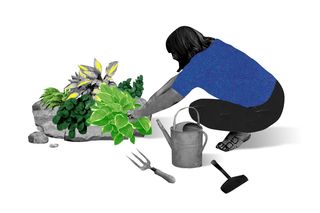
How Just a Month of Gardening Can Reduce Depression, Anxiety
Besides helping people connect with nature, gardening might also offer them greater exposure to vitamin D — overall, improving their mood.

The idea of sipping a cup of tea in the early hours of the morning, surrounded by the greenery of a private garden that sways with the breeze while filtering rays of the sun, sounds rather peaceful. Turns out, it can actually benefit our mental health too — especially if this garden is something we’ve nurtured ourselves.
Published in the journal PLOS One, a new study attests to the therapeutic benefits of gardening. It found that subjecting a small group of healthy women between the ages of 26 and 49 to a four-week-long gardening intervention improved their mental health.
“We believe this research shows promise for mental wellbeing, plants in healthcare, and in public health… At the end of the experiment, many of the participants were saying not just how much they enjoyed the sessions but also how they planned to keep gardening,” stated co-author Charles Guy, from the department of environmental horticulture at the University of Florida.
The reason why gardening improves people’s mental health may have to do with chemicals in the brain. The Permaculture College, Australia, notes that harvesting the fruits of one’s labor boosts dopamine — a “feel-good hormone” — in the brain, leading them to experience a sense of pleasure, or even euphoria. It is also suggested that coming into contact with soil — and, more specifically, Mycobacterium vaccae, a bacteria found therein — can trigger the release of serotonin, the “happiness hormone.”
Related on The Swaddle:
Just a Week‑Long Break From Social Media Can Reduce Anxiety, Depression: Study
“My [general practitioner] referred me to the garden years ago when I had depression. It was quite mild, but he thought gardening would be good for me. He was right. I came here for a year and saw all the seasons change,” Christine Dow, then 63, had told The Guardian in 2019. After a year of ‘garden therapy,’ she became such a believer in the treatment that she began volunteering for an organization that holds weekly therapeutic gardening sessions.
Nature itself has many benefits for humankind –it is linked to improving our ability to pay attention, sharpening our cognition skills, lowering stress, boosting empathy, bettering our mood, and putting us at reduced risk of psychiatric disorders. According to a 2019 study, spending just two hours of recreational time in nature every week can boost people’s health and wellbeing.
“Throughout history, humans have maintained a strong connection to plants and nature. Humans have relied on plants for survival, and some scholars believe that our attachment to nature has evolved through millions of years of evolution. But with increasing urbanization, city dwellers have fewer opportunities to interact with nature. One way for these populations to remain connected to nature is to visit public gardens or take up gardening,” noted an article on PsyPost. This is precisely why Canadian doctors are being encouraged to prescribe spending time in nature to their patients — alongside providing park passes — to bolster theirmental health.
Besides, gardening also involves a certain degree of physical exercise through activities like “weeding, digging, and raking.” And exercising, as we already know, doesn’t just have the ability to boost people’s moods, but also improves self-esteem and cognitive function.
Related on The Swaddle:
Music May Be as Beneficial for Mental Health as Exercise, Research Suggests
Moreover, gardening also has the potential to expose people to vitamin D, or the “sunshine vitamin.” With studies often linking low levels of vitamin D to worse symptoms of depression, perhaps, spending time in the sun may have a role to play in gardening’s purported benefits for mental health. Given that 79% of Indians have a vitamin D deficiency — dubbed a “shadowy epidemic in a sunny country” — gardening could turn out to be a feasible solution to the woes of a nation battling a multitude of mental health issues.
One might ask, though, if they would benefit from gardening irrespective of whether they have an inclination toward gardening. “Gardening is not for everyone… But, increasingly now, we’ve got evidence that even people who aren’t gardeners are able to reap the benefits of being outside, working with nature, and all the things that come with it,” Maria Devereaux, a project officer at the organization Dow volunteers for, said. Nonetheless, there doesn’t seem to be much research focusing on that — especially taking into account people with sensory issues that lead to bright rays of the sun overwhelming them, or the texture of the soil and plants to cause them distress.
In addition, the fact remains that not everybody’s economic situation would allow gardening. Gardening, of course, requires space that is unaffordable to many; the time and bandwidth one must devote to the activity, too, isn’t something everybody can spare. For many, in fact, gardening may seem like a luxury, then. Therein lies a limitation for gardening to be promoted as a one-stop solution for an entire population, which is regrettable since gardening might indeed have been one.
For those who can afford to garden, as Dow noted, “[A garden] an oasis of calm. You can come here and, for however long you are here, the outside world stays outside.”
Devrupa Rakshit is an Associate Editor at The Swaddle. She is a lawyer by education, a poet by accident, a painter by shaukh, and autistic by birth. You can find her on Instagram @devruparakshit.
Related


Working for Lower Wages Linked to Faster Mental Decline As We Age: Study
